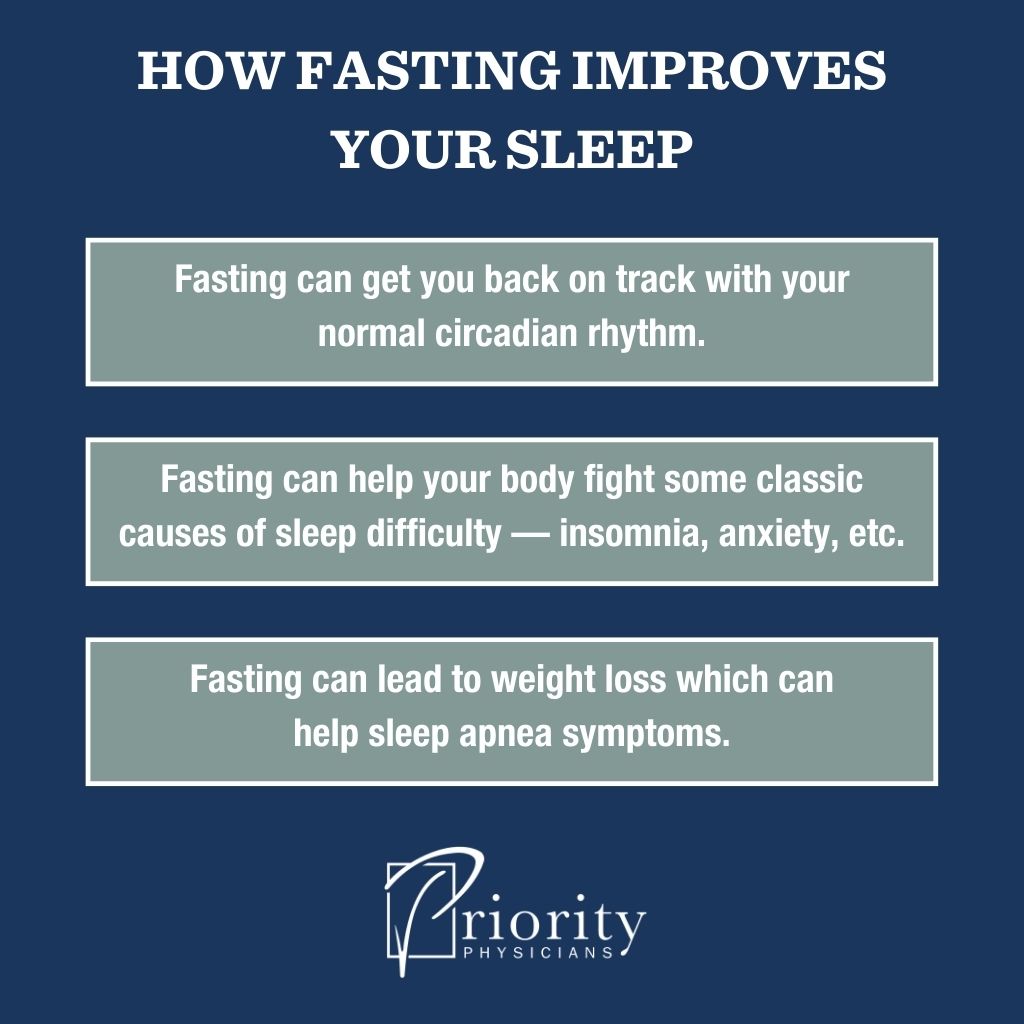This isn’t the first time we’ve discussed intermittent fasting.
Restricting your calorie-consumption window can have incredible benefits: weight loss, anti-aging effects, improving or sometimes even reversing type II diabetes, lowering inflammatory markers, even decreasing your risk of cancer. But did you know fasting can impact your body even after your head hits the pillow?
Today, we’re exploring the link between fasting and sleep.
How Do “Normal” Eating Patterns Impact Sleep?
Nobody wants to go to bed hungry. If you’ve ever tried to fall asleep on an empty stomach, you know it’s hard to do. However, eating right before bed can make falling asleep even more difficult.
Generally, Americans follow calorie-rich diets and have normalized eating excessively later in the day. Between large dinners and large desserts, many Americans eat more after 6 p.m. than they do throughout the rest of the day — which interferes with our sleep cycles.
Why? Well, think about how humans existed 100–200 years ago, when food wasn’t readily available. They did most of their eating during the day, moved around afterwards, and then went to bed. Now that food is more readily accessible, our eating and sleeping patterns are completely different.
When you have food in your gastrointestinal tract, your body has to do something with it. When you eat right before sleeping, your body has to use energy to break down food, when it could be using that energy to form memories and repair itself.
You’re making your body take on two complex processes at once — and the quality and quantity of your sleep suffer as a result.
Not to mention, the spike of glucose your body gets from processing the food you ate an hour before bedtime doesn’t make falling asleep any easier. We tell kids that a sugar high before bed is going to make it difficult to go to sleep, and adults aren’t any different.
Adults experience similar problems with drinking alcohol before bed. That nightcap actually interferes with your sleep, despite how relaxed it makes you feel.
What Is the Link Between Fasting and Sleep?

Fasting absolutely improves sleep. The link between fasting and sleep is undeniable.
When you fast, your body releases neurohormones that keep you awake and alert throughout the day. Then, at night, other neurohormones are released to help you sleep. In short, fasting can get you back on track with your normal circadian rhythm.
Second, fasting can help your body fight some classic causes of sleep difficulty. When you suffer from insomnia, your mind races, which can keep you from falling asleep — and having anxiety on top of insomnia is a recipe for disaster. Thankfully, fasting can improve sleep onset and sleep maintenance, meaning it reduces waking up in the middle of the night without getting back to sleep (which there aren’t many good medications for).
Third, patients who suffer from sleep apnea can often improve their condition through weight loss, which fasting can help with. Most people who fast intermittently lose at least five to 10 pounds, and that weight difference can minimize breathing interruptions during sleep.
Furthermore, realigning with your circadian rhythm not only helps you get more sleep, it also helps you get better quality sleep so you actually feel refreshed the next day. Your body should work like a fine-tuned machine, and fasting can help tune it.
What’s Considered Fasting?
Any time you’re not eating, you’re fasting. A fasting period can be as short as an hour or two. However, to experience the beneficial relationship between fasting and sleep, aim for a fast of at least 14 hours. If you’re able, 16 or 18 hours would be preferable.
Generally, the longer you fast, the better — but I wouldn’t recommend fasting longer than 24 hours without first talking to your doctor. Most people can fast for 18 hours without any difficulties, but when you get into a fast lasting longer than 24 hours, complications can arise.

